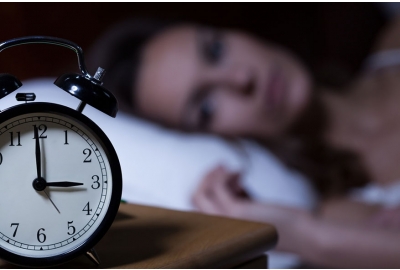
What Is Nocturia? 7 Ways to Manage Nighttime Incontinence
![]()
You’re sleeping peacefully, having pleasant dreams — then, you wake up to go to the bathroom. Maybe it happens again, and perhaps even a third time, before you finally drag yourself out of bed in the morning, exhausted from your midnight bathroom breaks. If you’re asking yourself, ‘why do I pee so much, especially during the night?’, nocturia might be the answer. Nocturia, also called frequent urination at night, is a common condition, but that doesn’t mean you have to live with the discomfort. Read on to get answers to all your nocturia FAQs and to learn the best tips for managing nighttime incontinence.
What is nocturia?
Nocturia technically refers to anytime you wake up in the middle of the night and need to use the bathroom. However, waking up once a night to go to the bathroom isn’t considered abnormal, and, for many people, getting up once doesn’t disrupt their sleep too much. So what is considered frequent urination at night, then? Nocturia becomes a problem when you are getting up twice a night (or more often), which disrupts your sleep cycle and cuts into your sleeping time.
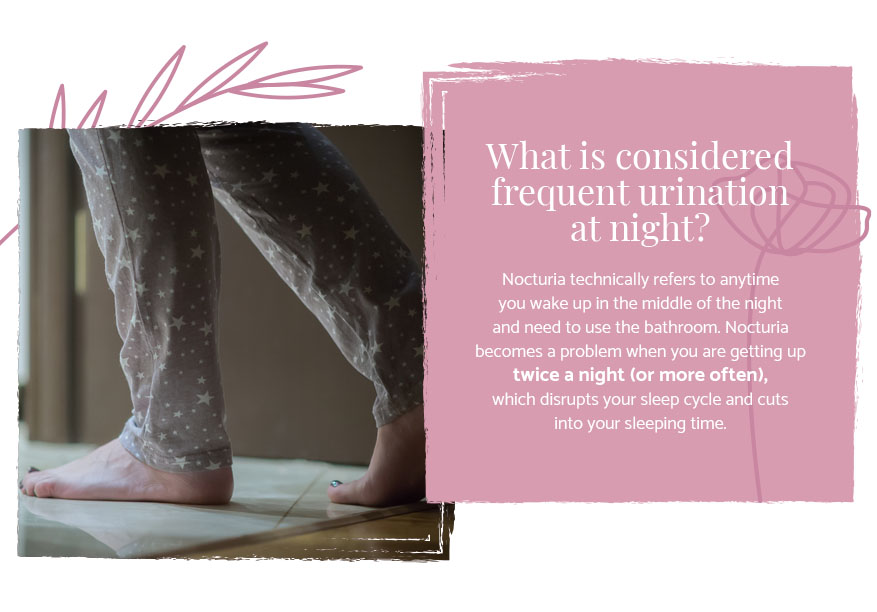
Nocturia isn’t technically the same thing as bedwetting, formally called nocturnal enuresis, which refers to urinating in the bed while you sleep. Nocturia involves getting the urge to urinate, waking up because of it, and making it to the bathroom in time. On the other hand, bedwetting occurs involuntarily, and often without a recognized urge. You don’t feel the need to go to the bathroom. You wake up and realize that you urinated in your sleep. People who experience nocturia may or may not wet the bed as well.
Who is most at risk of nocturia?
Nocturia is relatively common: 69 percent of men and 76 percent of women over age 40 get up to go to the bathroom at least once per night. About one-third of adults over age 30 get up two or more times per night. Nocturia increases with age, so the older the people get, the greater chance they have of experiencing nocturia. Women are somewhat more likely to have nocturia than men, especially at younger ages. Nocturia frequently occurs during pregnancy due to the pressure that the growing fetus puts on your bladder, but usually disappears within three months of giving birth as the muscles heal up. Rates of nocturia are higher in people who are black and Hispanic, even when controlling for gender and age, though it’s not completely clear why this is the case.
What causes nocturia?
There are several different causes of nocturia, and they may overlap. In some cases, nocturia may actually be a symptom of an underlying condition, such as bladder infection, kidney infection, bladder prolapse, edema (i.e., swelling of the lower legs), sleep apnea, diabetes, liver failure, and neurological diseases such as Alzheimer’s or Parkinson’s. In these cases, addressing the underlying condition will help alleviate the nocturia. Your doctor will work with you to determine if your nocturia has an underlying cause or not and then proceed from there.
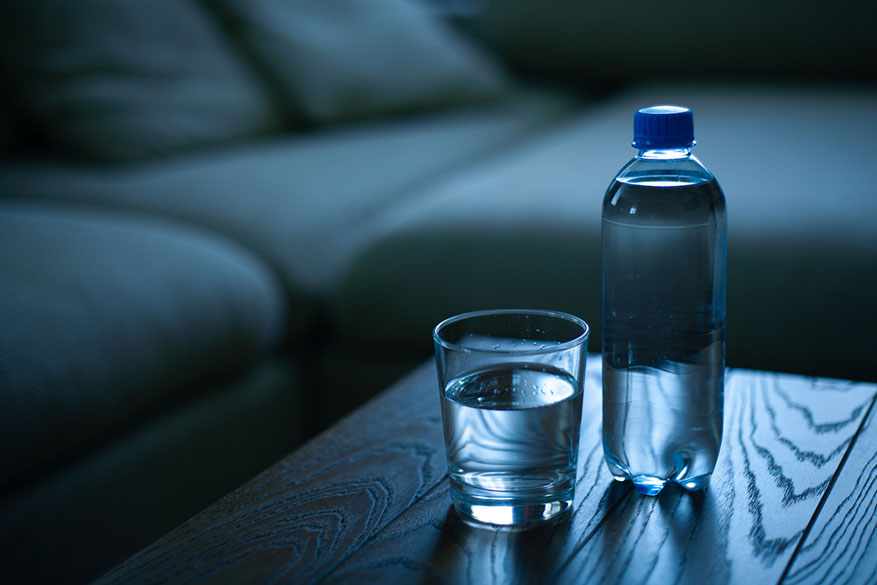
At its core, nocturia is caused by excess fluid production at night, officially known as polyuria. In some cases, the cause may be as simple as drinking too much fluid right before bed. It may also be related to certain medical conditions such as diabetes, as well as certain medications. When you lie down and raise your legs above your heart, your body also redistributes fluids that have collected in your legs during the day. Some of this may be converted into urine while you sleep, causing you to need to urinate in the middle of the night.
Lower bladder capacity can also contribute to nocturia. Weakened pelvic floor muscles caused by pregnancy or gynecological surgery may be a contributing factor. Irritation of the bladder and urinary tract — such as that caused by a UTI or bladder stones — can also make you urinate in the middle of the night.
While the connection might be a bit of surprise, nearly half of people with nocturia also have obstructive sleep apnea (OSA). Sleep apnea occurs when breathing stops during sleep, which often leads to disrupted sleep and frequent wakings. OSA actually increases urine production due to the way it reduces air flow and oxygen levels, which has ripple effects on the hormones that influence urine production. Since those with OSA wake up more frequently, they are also more likely to notice the need to urinate than those who sleep deeply through the whole night.
Can incontinence cause nocturia?
There are several different types of incontinence, and you may have one or several causes at a time. Nocturia is most likely to be caused by urge incontinence, which occurs when you have the strong urge to urinate even when your bladder isn’t full. The urge wakes you up, prompting you to go to the bathroom. You get this urge to go when the bladder muscle (aka the detrusor) contracts and signals that you need to urinate, even if your bladder isn’t full, which happens when you have an overactive bladder.
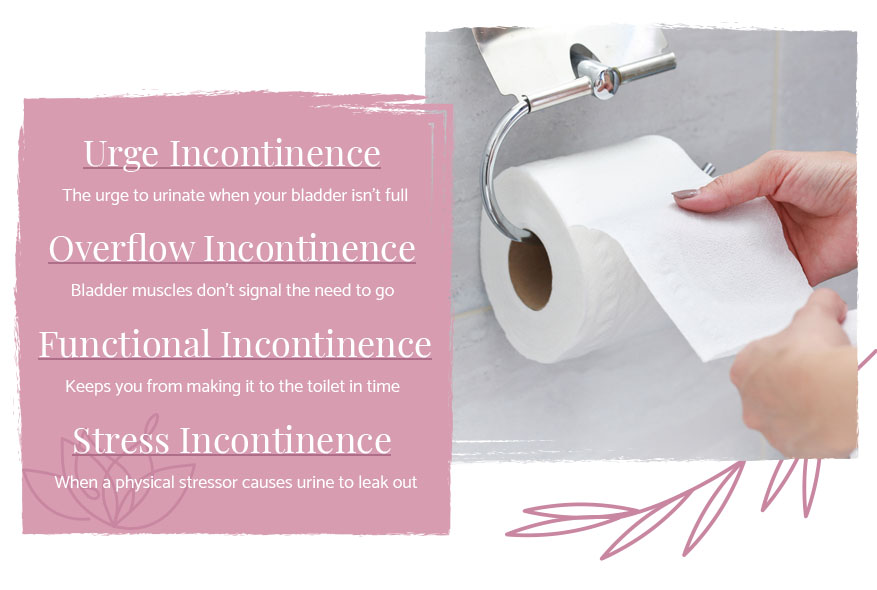
Overflow incontinence is the opposite problem. Your bladder muscles are underactive and don’t signal when you need to go, even when your bladder is full. Eventually, the bladder becomes so full that urine leaks out. Bedwetting may be caused by overflow incontinence, which is why you don’t wake up with the urge to go. Men are at a higher risk of overflow incontinence than women because an overly large prostate can put pressure on the urethra.
Learn More About Overflow Incontinence Here
Functional incontinence occurs when your urinary tract works fine and you get the urge to go at the right time, but you have a physical or mental condition that keeps you from making it to the toilet in time. For example, if you have arthritis, that can make it difficult to get to the bathroom and undress in time.
Stress incontinence occurs when a physical stressor — such as coughing, laughing, sneezing, or jumping — causes urine to leak out. This occurs when the urethral sphincter, the pelvic floor muscles, or both are weakened to the point that they cannot control the bladder normally. Because you’re sleeping, stress incontinence usually doesn’t play a large role in nocturia, though it can lead to bladder leakage during sex, another common nighttime activity.
You might have incontinence caused by several factors, which is referred to as mixed incontinence. Determining the causes of your nocturia and other incontinence issues can help you and your doctor come up with the most effective plan to manage your symptoms.
How is nocturia diagnosed?
As with other incontinence issues, your doctors will work with you to pinpoint the cause(s) of your nocturia. In addition to discussing your symptoms and health history, they will likely have you keep a bathroom diary to determine if there is a pattern to your nighttime incontinence. They might also have you take different clinical tests, including a urine culture and urinalysis, a blood test, a bladder scan, a cystoscopy, and/or urodynamic testing.

How does nocturia impact your sleep?
Nocturia negatively impacts both the quality and quantity of your sleep. If you’re getting up multiple times a night, you’re spending less time asleep, and, more importantly, less time in the deep restorative sleep that allows your body and mind to repair itself. In fact, nocturia is one of the most common causes for getting up in the middle of the night. Waking up multiple times may also contribute to insomnia, which is trouble falling or staying asleep.
This lack of sleep can translate to daytime drowsiness, mood swings, irritability, impaired physical and mental function, and more. Over time, chronic sleep deprivation can cause a whole host of negative effects on your health. For older adults, getting up multiple times a night in the dark also increases their risks of tripping and falling, which can result in fractures or breaks.
How to Manage Nocturia
So what can you do to manage your nocturia? Here are seven steps you can take to minimize the chance that you’ll need to go to the bathroom in the middle of the night:
Use the restroom before bed.
The best thing you can do to reduce the chances of nocturia is to completely empty your bladder before bed, even if you don’t feel like you need to urinate. In fact, you might find it helpful to go to the bathroom twice before bed, only a few minutes apart, to completely empty your bladder. Make it a part of your bedtime routine (more on this below) and soon you won’t even think twice about using the restroom before you climb under the covers.
Drink less fluids in the evenings.
If you tend to drink a lot of fluids in the evening, try to scale back that amount. Obviously, you don’t want to become dehydrated, but you also don’t want a lot of excess water passing through your system. All that extra fluid will go right to your bladder. If you need to, you can drink more throughout the day, which will help you stay hydrated through the night. Try to take small but frequent sips of water, as opposed to occasionally chugging it, to increase absorption and slow down the rate that water enters your bladder.
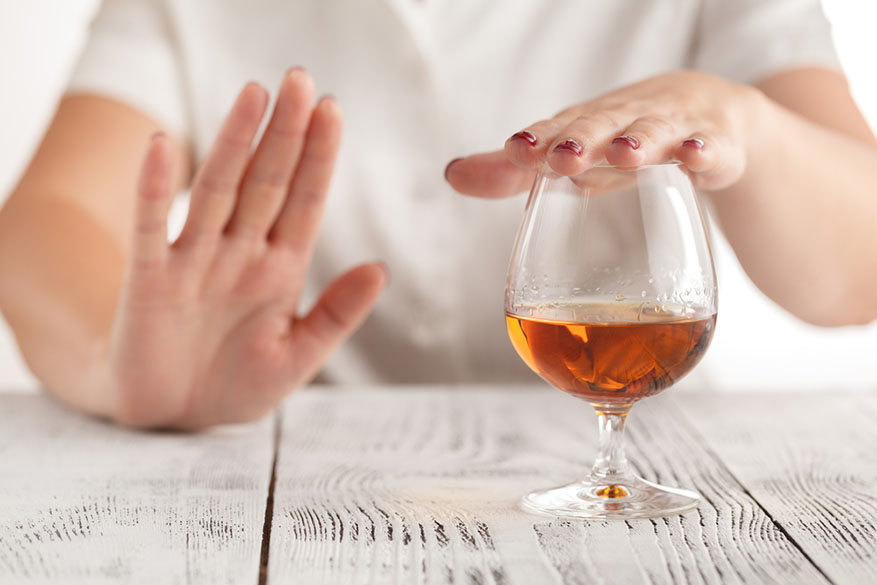
Avoid certain beverages and foods.
Certain foods and drinks can make you use the bathroom often or irritate your bladder. Alcoholic drinks and caffeinated beverages, such as coffee and tea, are common culprits that can make you feel the urge to urinate more often. There are also many different potential foods that can irritate your bladder and cause urination problems, including chili, citrus fruits, and tomatoes. If you think foods might be irritating your bladder, your doctor will likely put you on an elimination diet to determine which ones are triggers for your nocturia.
Learn How to Calm an Irritated Bladder
Elevate your legs.
When you sleep, your body takes the fluids that settled in your legs during the day and brings it back to the core. Some of that fluid may be converted to urine, causing you to go to the bathroom in the middle of the night. Try lying down and elevating your legs above your heart for an hour or so before you actually go to sleep to jumpstart this process. If you struggle with a lot of lower body swelling, your doctor might have you start wearing compression socks during the day to promote better circulation and reduce fluid retention in your lower extremities.
Consider bladder training.
If you have urge incontinence, your doctor might have you try out bladder training, which is designed to help you increase the intervals between your bathroom trips. Bladder training teaches you to wait out the urge and helps your body recognize when it actually has to go. However, bladder training isn’t appropriate for all kinds of nighttime incontinence, as holding in your urine when you genuinely do have to go can further irritate your bladder and cause other problems. Talk to your doctor about whether or not bladder training could help manage your incontinence.
Set a sleep routine.
Sleeping and waking up at the same times, even on weekends, helps promote better sleep overall and will help you fall asleep faster. Having a routine before bed also helps cue your body and brain that it’s time to fall asleep. For example, your nighttime routine might include changing into your pajamas, brushing and flossing your teeth, using the restroom, and putting on hand lotion before climbing in bed. Try to do the same thing before bed each night to build your routine and give your body the signal that it’s time to go to bed.
Limit potential disruptions.
Sometimes, it’s not the urge to urinate that wakes you up, but rather light, noise, or another source. Try to minimize these disruptions as much as possible to reduce the chances that you will wake up in the middle of the night. If you tend to leave a light on because you get up so much, try a motion-activated light that will only come on when you move. You should definitely make it as safe as possible for you to use the bathroom at night, though, hopefully, not at the expense of your sleep.
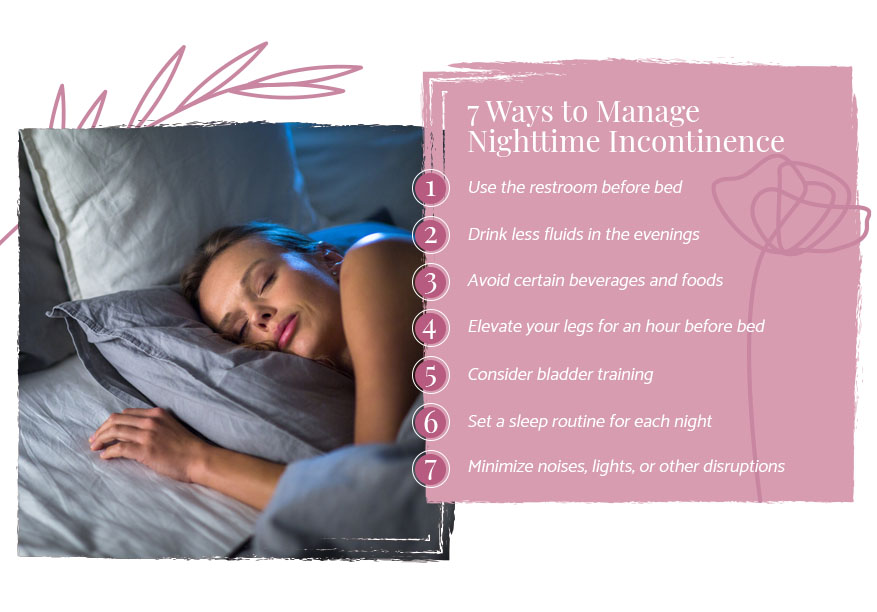
Nocturia can seriously disrupt your sleep and your life, but it doesn’t have to be that way. Follow these strategies to start managing your nighttime incontinence.
Image Credits
Serge Vo / Shutterstock.com
AndreyCherkasov / Shutterstock.com
l i g h t p o e t / Shutterstock.com
Photographee.eu / Shutterstock.com
Zyn Chakrapong / Shutterstock.com
mutie / Shutterstock.com
Stock-Asso / Shutterstock.com